November 22, 2025 | 12:58 GMT +7
November 22, 2025 | 12:58 GMT +7
Hotline: 0913.378.918
November 22, 2025 | 12:58 GMT +7
Hotline: 0913.378.918
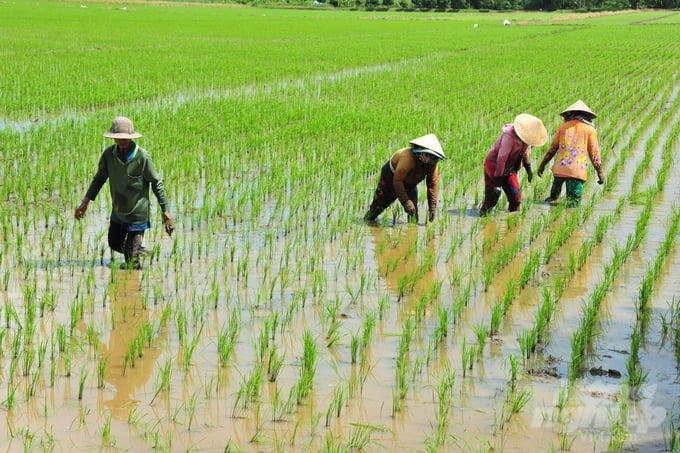
An Giang’s farmers apply water-saving irrigation techniques and see a big difference in production costs, so the method is increasingly popular among rice producers. Photo: Le Hoang Vu.
Alternate wetting and drying (AWD) is a water management technique in rice cultivation. By reducing the number of times needed to pump water and irrigate the field in a certain area, AWD proves to be an effective solution to reduce fuel and electricity costs.
For many years, An Giang farmers have been trained to master the knowledge of water-saving irrigation techniques in rice cultivation and gradually apply them in rice production such as AWD or the familiar "1 must 5 decreases" (1P5G) process, contributing to improve farmer’s profit.
Since the 2023 winter-spring crop, Nguyen Van Be, a farmer in Vong Dong commune, Thoai Son district participated in a pilot project to plant 1 ha of rice and apply water-saving irrigation methods in combination with "1 must 5 decreases" and "3 decreases 3 increases” (3G3T), according to the guidelines of An Giang agricultural sector.
As for results, the application of water-saving irrigation helps farmers manage pests and diseases better, save fresh water. The rice thrives with only a little amount of care required. The amount of fertilizer used is 25 - 30% less compared to traditional farming methods.
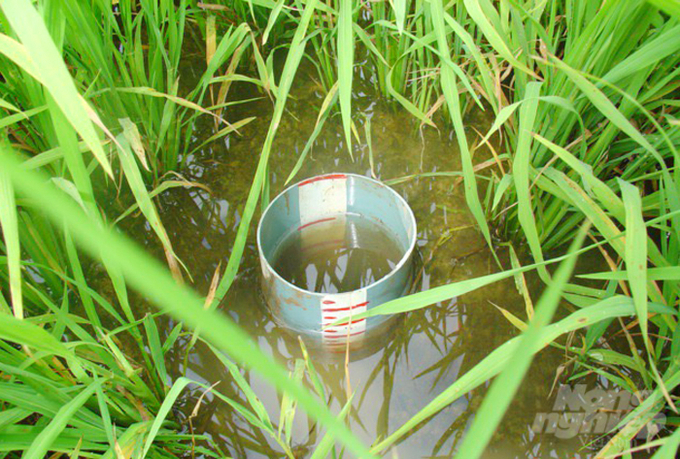
The application of water-saving irrigation techniques helps farmers manage pests and diseases better. Photo: Le Hoang Vu.
“If it was before, the winter-spring rice crop usually costs 1.6 - 1.8 million VND/cong (Vietnamese measurement, equal to 1,000 m2) on average. Thanks to the application of this new technique, the cost is reduced to 1.2 - 1.3 million VND/cong”.
Assessing the efficiency of the AWD technique, Be said that his field’s productivity is always maintained high. Typically in the last winter-spring rice crop, his family harvested 1 ha of rice, yielding 1.1 - 1.2 tons/cong, and the summer-autumn crop yielding 850- 900 kg/cong. The selling price was 6,700 - 6,800 VND/kg. After deducting all expenses, Be's family gained a 40% profit for each crop.
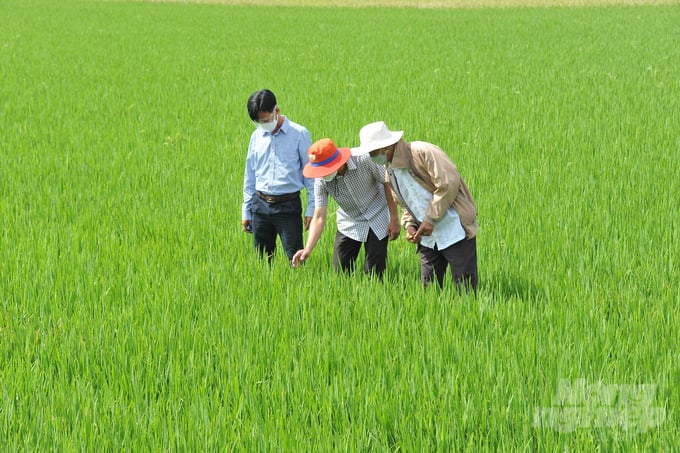
Applying AWD in the experimental fields always results in a 0.5 tons/ha increase in yield. Photo: Le Hoang Vu.
Truong Kien Tho, Deputy Director of An Giang Department of Agriculture and Rural Development, says that agroproduction is facing a series of challenges under the impact of climate change, namely water resources are under serious threat.
“Facing the current situation, developing water-saving irrigation techniques to use water resources efficiently and sustainably in agriculture has become a common trend in many countries around the world, and Vietnam is no exception”.
According to his explanation, rice cultivation using AWD can help rice growers reduce greenhouse gas emissions by 20-30% compared to continuous flooding of rice fields. This reduction is significant because rice production is responsible for 15 - 25% of global methane emissions.
“The next step is to lessen the use of inorganic nitrogen fertilizers to reduce nitrous oxide emissions. Fully utilizing rice straw as a source of fertilizer is a way to replace Inorganic nitrogen fertilizers with organic fertilizers. This has a dual benefit. Farmers no longer burn rice straw in the field, and the situation of carbon emissions is also less severe”.
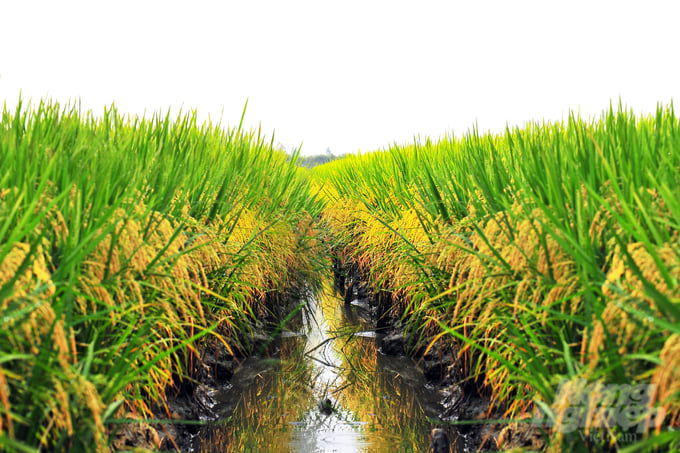
Not only reducing greenhouse gas emissions, but water-saving irrigation also helps rice become stronger and give more yield. Photo: Le Hoang Vu.
The International Rice Research Institute (IRRI) transferred the AWD technique to the Plant Protection Department in 2005. The technique was successfully tested in An Giang, Dong Thap, Tien Giang, and Can Tho.
AWD is now considered the most effective method and is highly recommended by experts. In the Mekong Delta, many locations with high terrain often lack water in the dry season, so water-saving rice cultivation is seen as a promising new farming method.
Nguyen Van Hien, Director of An Giang Sub-department of Crop Production and Plant Protection, says that An Giang is one of the provinces with the largest rice production in the Mekong Delta with an output of over 4.2 million tons of commodity rice per year.
“Thanks to the technology transfer from IRRI, An Giang has been able to implement this technology since 2005 and even developed a water-saving irrigation scheme to help farmers further reduce watering costs in rice cultivation”.
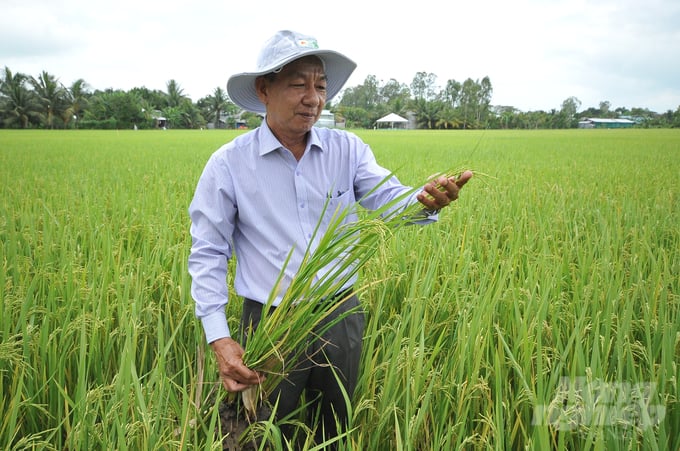
Nguyen Van Hien, Director of An Giang Sub-department of Crop Production and Plant Protection, believes that rice cultivation applying water-saving techniques in combination with effective models such as 1P5G or 3G3T is a sustainable, environment-friendly direction for the agricultural sector. Photo: Le Hoang Vu.
Over the years of implementing the water-saving irrigation program, farmers have been able to see the overall benefits of the program, such as stronger stalks, longer panicles and more solid grains, reduced fall of rice plants thanks to deeper roots. The number of times to pump water is reduced, resulting in lower input costs. The yield is 0.5 tons/ha higher than that of normal farmers' fields. Since then, AWD has been widely applied in the province’s rice production areas, up to a total of 500,000 ha at the moment.
Translated by Samuel Pham

(VAN) Results from the Sustainable Durian Model Project in Dak Lak have confirmed the critical role of Yara Viet Nam in transferring advanced nutritional solutions to farmers.

(VAN) In Tuyen Quang province, livestock farmers have introduced effective models and innovative practices that significantly strengthen African Swine Fever prevention and control efforts.

(VAN) This is the study conducted by IRRI and Can Tho University on the rice straw value chain in Mekong Delta showing an economic potential of more than 6.6 trillion VND/year.

(VAN) By participating in cooperative economics, many farmers in Tay Ninh have overcome hardship, mastered clean dragon fruit cultivation techniques.

(VAN) The crossbreeding program in the former Binh Dinh province (now part of Gia Lai) has shown signs of decline, and urgent measures are needed to revive it and sustain past achievements.

(VAN) The agricultural sector agreed on a roadmap to pilot the MRV protocol and expand low-emission rice production from the 2025-2026 winter-spring crop.

(VAN) Agricultural extension officers in Quang Ninh do more than transmit knowledge; they have become a steadfast support system for farmers on the path to sustainable agricultural development.